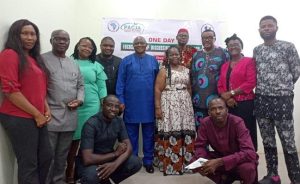Etta Michael Bisong, who attended an inception meeting in Abuja to gather stakeholders’ perspectives on how to track the implementation of Nigeria’s Nationally Determined Contributions (NDCs), explores their perspectives and thoughts on how the country can successfully achieve this ambitious goal

Overview
Nigeria, one of the 12 African nations chosen to receive capacity-building on how to successfully monitor progress in NDC implementation, has completed stakeholder mapping and analysis. The exercise aims to identify key sectoral actors and how to support them in carrying out this revolutionary task.
The project began in 2018, when five researchers from the African Technology Policy Studies Network (ATPS) and its partners, the Pan-African Climate Justice Alliance (PACJA) and the Western Africa Green Economic Development Institute (WAGEDI), collaborated to create tools and indexes to assist African countries in tracking their NDC performance progress.
The programme was originally intended for five countries in the region, but after approaching the African Development Bank (AfDB) with the idea, they requested that it be expanded to include seven more, namely Botswana, Ghana, Nigeria, Kenya, Namibia, Zambia, Uganda, Tanzania, Zimbabwe, Ethiopia, Sierra Leone, and Cote d’Ivoire, with plans to expand the initiative across the entire continent.
This group of researchers is curious about how these countries propose to account for their progress. As a result, they created monitoring tools and indexes based on five indicators – governance, mitigation, adaptation, funding, measuring, reporting, and verification (MRV), and stakeholder power and influence – to answer the question.
Ultimately, it is anticipated that the data will be used to inform practises and policy changes that support the implementation of NDCs and other environmental and climate change activities throughout Africa.
Importance of the project to Nigeria
The NDC is a document that Nigeria submitted under the Paris Climate Agreement that will track both conditional and unconditional efforts, making it obligatory for the government to understand its mitigation and adaptation measures.
According to Professor Magnus Onuoha, executive director of WAGEDI, there are seven sectors tasked with implementing this text in the country, and this one-stop information system will help these sectors track what other African countries are doing and access climate finance.
Now that the paperwork is in place, he thinks it is critical to track it and understand what is going on, saying that “we have not accessed this finance” because “we lack the capacity.”
For him, it is not a matter of obtaining the paper; rather, he is concerned with people’s involvement and supervision of the process.
There is a training-the-trainer component to the project, and he said that when these stakeholders are identified, they will be empowered to train Nigerians to begin to comprehend what the NDC is all about and their roles in it.
Communication, for example, is vital, as the WAGEDI chieftain stated, to bring attention to the language that would be used to deliver the message.
So it’s a full spectrum, he confessed, and “I believe that at the end of the day, prosperity would be kind to us.”
Challenges and solutions
One of the primary issues limiting progress in the implementation of Nigeria’s NDCs is that it has been dominated and pushed by the public sector with little or no regard for other stakeholders.
The issue at hand is carbon, which has no boundaries because everyone breathes the same air. Climate change has frequently targeted Nigeria, notably floods, which continue to kill people and damage their socioeconomic activities. Some of the climatic difficulties that the country must solve include erosion in the southeast and desert expansion in the southwest.
Private actors are profit-driven and will only invest in an environment where their interests are legally safeguarded. However, it is intended that with the implementation of this project, additional advocates from civil society organisations, the media, and research institutions, including development partners, will be mainstreamed into the conversation.
The Climate Change Act 2021 is another boost that supports private sector participation in NDC implementation and will help improve these projects, particularly the provision of the Act that addresses carbon budgeting.
Although climate change has disastrous repercussions for people’s peaceful coexistence, Onuoha wants Nigeria to focus on the opportunities it provides, such as renewable energy and climate-smart agriculture.
He noted that the majority of what the country is doing is mitigation, and that many of them are now profitable. It also indicates on the index that Nigeria is perceived to be performing well on governance issues as a result of its Climate Change Act.
“I thank God we have highly resourceful people today, and you can see the level of input that came out of here, and it is a natural thing,” he said, adding that the information will be utilised to influence policy.
Conclusion
To reconcile their differences, African countries must come together and take a unified approach to their NDC implementation.
After assessing the questionnaire, which gave direction on areas where capability is necessary and the next steps, varied perspectives were expressed in Nigeria.
The problems at hand, according to Professor Michael Madukwe, national coordinator at ATPS, are technical, and without bringing industry players together, “we cannot move forward,” since “we will not know their areas of need or training required.”
Prof. Madukwe was overjoyed that stakeholders were eager to provide information, which he said ATPS and her partners will use to bridge gaps and help African countries successfully track the implementation of their NDCs.
